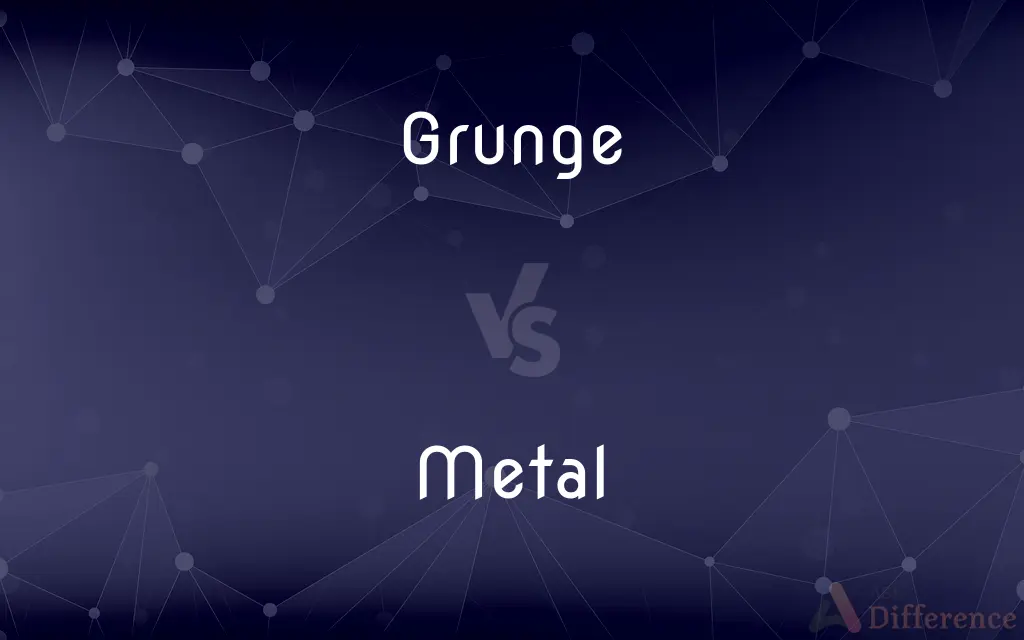Grunge vs. Metal — What's the Difference?
By Fiza Rafique & Urooj Arif — Updated on May 13, 2024
Grunge emphasizes raw, distorted sounds and introspective lyrics, rooted in punk and alternative rock; metal features complex structures, heavy distortion, and thematic intensity, spanning subgenres like thrash and black metal.

Difference Between Grunge and Metal
Table of Contents
ADVERTISEMENT
Key Differences
Grunge emerged primarily from the Pacific Northwest, specifically Seattle, in the late 1980s, drawing heavily on the energy and simplicity of punk rock and the distortion of heavy metal but with a distinct sense of apathy and disillusionment in its sound and lyrics. Metal, with its roots a bit earlier, originated as a harder, more intense offshoot of rock music, characterized by its powerful, high-energy impact, complex structures, and themes that often venture into dark or fantastical realms.
Vocally, grunge is known for its introspective and often somber lyrical content, delivered with a raw, unpolished vocal style that enhances its emotional depth. Metal vocals vary widely, from melodic singing to aggressive shouting and growling, fitting a broader spectrum of emotional and thematic expression, from anger and rebellion to epic storytelling.
The guitar work in grunge typically features heavily distorted rhythms and simpler, stripped-down solos that emphasize mood over technical complexity. In contrast, metal guitar playing is often technically demanding, featuring rapid solos, complex riffs, and a high degree of musical proficiency.
The aesthetics of grunge bands were notably understated, marked by flannel shirts, jeans, and an overall unkempt, anti-fashion stance, reflecting its roots in a disenchanted youth culture. Metal aesthetics can be flamboyant or theatrical, with leather, chains, and long hair as part of its iconic style, projecting an image of bold defiance and nonconformity.
Culturally, grunge was seen as a counter-movement to the flashy excesses of 1980s music scenes, embodying a more serious, introspective approach to music and life. Metal has often positioned itself as outside mainstream culture, with a strong community identity that embraces its distinctiveness and complexity, often dealing with themes of power, conflict, and the supernatural.
ADVERTISEMENT
Comparison Chart
Origins
Late 1980s, Seattle
Late 1960s, early 1970s, UK and USA
Sound
Distorted guitars, raw production
Highly amplified distortion, aggressive tones
Lyrics
Apathetic, angst-filled, introspective
Diverse, from dark and fantastical to aggressive and rebellious
Vocal Style
Raw, unpolished
Ranges from melodic to aggressive shouting and growling
Guitar Work
Simpler solos, heavy distortion
Technically complex solos and riffs
Aesthetics
Flannel shirts, jeans, anti-fashion
Leather, chains, theatrical
Cultural Impact
Counter-movement to 1980s excess
Distinctive community identity, often outside mainstream
Compare with Definitions
Grunge
A subgenre of alternative rock that emerged in the late 1980s in Seattle.
Nirvana and Pearl Jam became icons of grunge.
Metal
A genre of rock music known for its loudness and aggressive sound.
Metallica and Iron Maiden are among the most influential metal bands.
Grunge
Represents a more introspective and subdued approach to rock music.
Grunge music often reflects a deep, introspective sadness.
Metal
Thematically broad, ranging from personal angst to larger-than-life epics.
Metal lyrics can explore everything from personal struggle to epic fantasy battles.
Grunge
Lyrics often express disillusionment and societal apathy.
Grunge lyrics frequently tackle themes of disillusionment and angst.
Metal
Emphasizes high energy and technical skill in its musical execution.
Metal music is known for its precise and technical instrumental execution.
Grunge
Known for its distorted guitar sound and raw aesthetic.
The grunge band's sound was heavily influenced by punk's raw energy.
Metal
A metal (from Greek μέταλλον métallon, "mine, quarry, metal") is a material that, when freshly prepared, polished, or fractured, shows a lustrous appearance, and conducts electricity and heat relatively well. Metals are typically malleable (they can be hammered into thin sheets) or ductile (can be drawn into wires).
Grunge
Style marked by a distinctly casual, anti-fashion statement.
The typical grunge fashion included flannel shirts and ripped jeans.
Metal
A solid material which is typically hard, shiny, malleable, fusible, and ductile, with good electrical and thermal conductivity (e.g. iron, gold, silver, and aluminium, and alloys such as steel)
Being a metal, aluminium readily conducts heat
An adjustable pole made of metal
Grunge
Grunge (sometimes referred to as the Seattle sound) is an alternative rock genre and subculture that emerged during the mid-1980s in the American Pacific Northwest state of Washington, particularly in Seattle and nearby towns. Grunge fuses elements of punk rock and heavy metal, but without punk's structure and speed.
Metal
Broken stone for use in making roads
The work also involves dealing with rock aggregates for potential use as suitable road metal
Grunge
(Informal) Filth; dirt.
Metal
Molten glass before it is blown or cast.
Grunge
Rock music that incorporates elements of punk rock and heavy metal, often expressing a bleak or nihilistic outlook.
Metal
Heavy metal or similar rock music
Crunching power-trio metal
Industrial music is also a blend of metal and techno
Grunge
(informal) Dirt or filth, especially when difficult to clean.
The cinema floor was covered in grunge deposited by the crowds.
Metal
Made from or coated with metal
A range of metalled key rings
Grunge
(informal) The state of being filthy; grubbiness.
Chad used to work as a coal miner, but couldn't handle the constant grunge.
Metal
Make or mend (a road) with road metal
The road was metalled and tolls charged for the upkeep
Follow the metalled road for about 200 yards
Grunge
(music genre) A subgenre of alternative rock, originating from Seattle, Washington, which melds punk and metal.
Alice liked to wear plaids and ripped jeans, and listen to grunge.
Metal
Any of a category of electropositive elements that usually have a shiny surface, are generally good conductors of heat and electricity, and can be melted or fused, hammered into thin sheets, or drawn into wires. Typical metals form salts with nonmetals, basic oxides with oxygen, and alloys with one another.
Grunge
The state of being covered with unclean things
Metal
An alloy of two or more metallic elements.
Metal
An object made of metal.
Metal
Basic character; mettle.
Metal
Broken stones used for road surfaces or railroad beds.
Metal
Molten glass, especially when used in glassmaking.
Metal
Molten cast iron.
Metal
(Printing) Type made of metal.
Metal
(Music) Heavy metal.
Metal
To cover or surface (a roadbed, for example) with broken stones.
Metal
(heading) Chemical elements or alloys, and the mines where their ores come from.
Metal
Any of a number of chemical elements in the periodic table that form a metallic bond with other metal atoms; generally shiny, somewhat malleable and hard, often a conductor of heat and electricity.
Metal
Any material with similar physical properties, such as an alloy.
Metal
(astronomy) An element which was not directly created after the Big Bang but instead formed through nuclear reactions; any element other than hydrogen and helium.
Metal
Crushed rock, stones etc. used to make a road.
Metal
(mining) The ore from which a metal is derived.
Metal
(obsolete) A mine from which ores are taken.
Metal
(tincture) A light tincture used in a coat of arms, specifically argent (white or silver) and or (gold).
Metal
Molten glass that is to be blown or moulded to form objects.
Metal
(music) A category of rock music encompassing a number of genres (including thrash metal, death metal, heavy metal, etc.) characterized by strong drum-beats and distorted guitars.
Metal
The substance that constitutes something or someone; matter; hence, character or temper.
Metal
The effective power or calibre of guns carried by a vessel of war.
Metal
The rails of a railway.
Metal
The actual airline operating a flight, rather than any of the codeshare operators.
We have American Airlines tickets, but it's on British Airways metal.
Metal
(music) Characterized by strong drum-beats and distorted guitars.
Metal
Having the emotional or social characteristics associated with metal music; brash, bold, frank, unyielding, etc.
Metal
To make a road using crushed rock, stones etc.
Metal
An elementary substance, as sodium, calcium, or copper, whose oxide or hydroxide has basic rather than acid properties, as contrasted with the nonmetals, or metalloids. No sharp line can be drawn between the metals and nonmetals, and certain elements partake of both acid and basic qualities, as chromium, manganese, bismuth, etc.
Metal
Ore from which a metal is derived; - so called by miners.
Metal
A mine from which ores are taken.
Slaves . . . and persons condemned to metals.
Metal
The substance of which anything is made; material; hence, constitutional disposition; character; temper.
Not till God make men of some other metal than earth.
Metal
Courage; spirit; mettle. See Mettle.
Metal
The broken stone used in macadamizing roads and ballasting railroads.
Metal
The effective power or caliber of guns carried by a vessel of war.
Metal
Glass in a state of fusion.
Metal
The rails of a railroad.
Metal
To cover with metal; as, to metal a ship's bottom; to metal a road.
Metal
Any of several chemical elements that are usually shiny solids that conduct heat or electricity and can be formed into sheets etc.
Metal
A mixture containing two or more metallic elements or metallic and nonmetallic elements usually fused together or dissolving into each other when molten;
Brass is an alloy of zinc and copper
Metal
Cover with metal
Metal
Containing or made of or resembling or characteristic of a metal;
A metallic compound
Metallic luster
The strange metallic note of the meadow lark, suggesting the clash of vibrant blades
Metal
Features complex guitar solos and powerful vocals.
Metal songs often showcase fast, complex guitar solos and powerful vocal techniques.
Metal
Associated with distinctive, often theatrical fashion.
Metal fashion includes leather jackets, band logos, and studded accessories.
Common Curiosities
How does metal differ from other rock genres?
Metal distinguishes itself with its amplified distortion, complex guitar solos, and themes that often delve into the fantastical or confrontational.
Can grunge be considered a type of metal?
While grunge incorporates some elements of metal, such as guitar distortion, it is generally considered a separate genre that emphasizes simplicity and mood over metal's complexity and intensity.
What are typical themes in metal music?
Metal music often tackles themes of rebellion, mythology, war, and personal strife, with a dramatic and sometimes theatrical approach.
What defines the grunge sound?
Grunge is defined by its distorted guitar sounds, raw production values, and emotionally charged lyrics that express apathy or angst.
How did grunge impact 1990s music culture?
Grunge significantly shaped 1990s music culture by bringing alternative rock into the mainstream and influencing a generation with its more serious and introspective approach to music and lifestyle.
Why did grunge decline in popularity?
Grunge declined in popularity towards the late 1990s due to a combination of factors including the commercial saturation of the genre, the death of key figures like Kurt Cobain, and a shift in musical trends towards more polished and electronically influenced styles.
What visual elements are associated with metal bands?
Metal bands often incorporate visual elements like elaborate stage setups, dramatic lighting, and distinctive, often dark or gothic fashion styles.
Is there overlap between grunge and metal fan communities?
There can be some overlap, as both genres appeal to listeners who appreciate intense, guitar-driven music, though each genre also attracts fans with specific tastes and cultural affiliations.
What role does imagery play in metal music?
Imagery in metal music often plays a crucial role, enhancing the thematic elements of the songs with visuals that might include fantasy, horror, and historical motifs, often used in album artwork, band merchandise, and music videos.
How do grunge musicians typically approach songwriting?
Grunge musicians typically approach songwriting with a focus on authenticity and emotional expression, often using personal experiences and societal observations as the basis for their lyrics, coupled with raw, powerful musical compositions.
Share Your Discovery

Previous Comparison
Pound vs. Sterling
Next Comparison
Legend vs. FableAuthor Spotlight
Written by
Fiza RafiqueFiza Rafique is a skilled content writer at AskDifference.com, where she meticulously refines and enhances written pieces. Drawing from her vast editorial expertise, Fiza ensures clarity, accuracy, and precision in every article. Passionate about language, she continually seeks to elevate the quality of content for readers worldwide.
Co-written by
Urooj ArifUrooj is a skilled content writer at Ask Difference, known for her exceptional ability to simplify complex topics into engaging and informative content. With a passion for research and a flair for clear, concise writing, she consistently delivers articles that resonate with our diverse audience.
















































